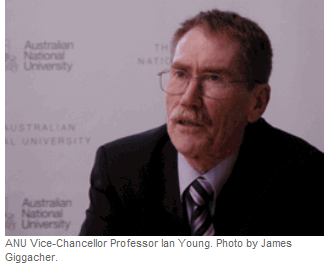|
|
|
|
|
|
|
News & Views item - March 2011 |
![]() ANU's New V-C Speaks Out. (March 22, 2011)
ANU's New V-C Speaks Out. (March 22, 2011)
On March 1 Professor Ian Young took over the Vice-Chancellorship of The
Australian National University. Now three weeks into the job he has addressed
the Council for Humanities, the Arts and Social Sciences at a parliamentary conference in Canberra.
Arts and Social Sciences at a parliamentary conference in Canberra.
Here is part of what he had to say but it'd be well worth rereading comments written just under a fortnight ago by economics Laureate Paul Krugman.
Ian Young:
The Labor government came to office with a major plan of investment in and expansion of Australia's education system. Implementation, particularly within the schools sector, has, however, been problematic and controversial.
... two issues are of concern. The first is that with the government facing other challenges, it may feel that educational reform is done when it is, in fact, far from complete. The second concern is the question: to what end are we developing a more educated society? Where are the jobs and the industries to satisfy such a well-educated population?
Calls for Australia to develop more knowledge-intensive industries are not new, but now is both a critical and opportunistic time to couple the education investment with a broader knowledge investment... The worst-case outcome would see the resources boom eventually end and Australia discover that it has little else left. To put all our eggs in the minerals basket is clearly a high-risk strategy.
OECD figures show that public spending on tertiary education in Australia is about 0.7 per cent of gross domestic product. Clearly, this will rise as the system is expanded in coming years. However, the spending compares poorly with Denmark at 1.6 per cent, Sweden at 1.4 per cent, Norway at 1.2 per cent and the Netherlands at 1.1 per cent. On average, public investment in tertiary education in these countries is twice that of Australia. It is no surprise that these countries have been able to develop high value-added export industries, despite high production costs and high exchange rates. These countries also have high social cohesion.
The University of Leiden ranks world universities by the number of citations of their research works. The results are corrected for institutional size and for discipline differences. Those four countries between them have 23 institutions in the top 200 - Australia has two. The data is telling - investments in tertiary education and R&D flow through to quality research and high value-added export industries. Will we take the next step of following the investment in education with a similar investment in R&D?
Can the electorate be convinced that such an investment is essential or will the public opt for alternatives such as short-term tax cuts? I believe it is our job to make the case for investment - day in and day out. It is time for a national public debate on these issues. It is time for us to ask, as a nation: are we up to investing in a knowledge future?